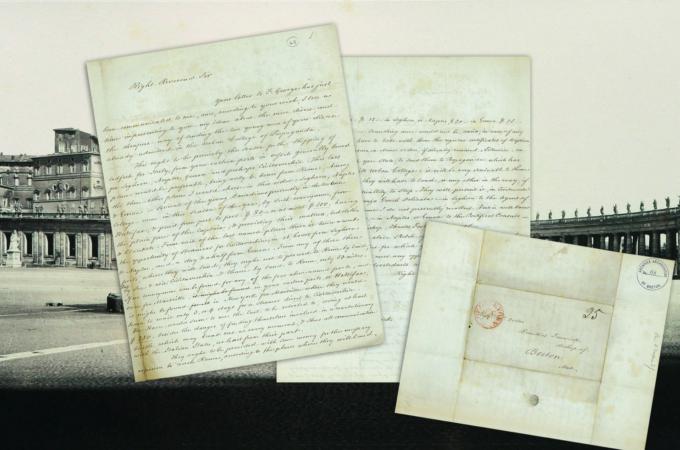Seminarians prepare for journey to Rome in 1840
On Dec. 1, 1840, Father Francis Vesprei, SJ, replied to Bishop Benedict Fenwick of Boston regarding his request for guidance about "the cheapest way of sending the two young men of your diocese already admitted in the Urban College of Propaganda [in Rome]."
The Pontifical Urbaniana University was a seminary formally established as an organ of the Propaganda Fide, responsible for missionary work and related activities, by Pope Urban VIII (1623-1644) upon the publication of his Papal Bull "Immortalis Dei Filius'' on Aug. 1, 1627. It was intended "for the formation of candidates for the priesthood from mission countries," which lacked their own institutions for training of priests. At this period in time, it was operated by the Society of Jesus (Jesuits).
In his letter, Father Vesprei outlines several routes by which the students could reach Rome. He recommends leaving during the season when salted cod is shipped from the east coast of the United States to Italy, as many vessels are bound for Leghorn (Livorno), Naples, Genoa, and Civitavecchia, all on Italy's western coast. The latter was most preferable, only about six hours from Rome, though he warns this last leg should be accomplished by water, not land.
If passage could only be secured to one of the other three Italian ports, then the students would still need to find their way to Civitavecchia before continuing to Rome, which could be done by the twice-weekly steamships traveling between those cities. Leghorn was closest, followed by Naples, both a 15-hour trip by steamship, and, as the farthest, Genoa was a one-and-a-half-day journey.
If not directly to Italy, then stopping in France was an option, albeit a more costly one. Marseille was the preferred port, while traveling through Havre on the English Channel being the most expensive. Father Vesprei raises other concerns about traveling via France, fearing the students may find "themselves involved in a revolutionary bustle, which may break out at every moment and thus all communication with the Italian States, at least from their part."
Father Vesprei mentions that passage for several Canadian students to Civitavecchia recently cost between $80 to $100 each, but they reduced costs by choosing to eat basic fare and supplying their own mattresses, sheets and blankets for the crossing.
To reach Rome from Civitavecchia it cost the students an additional $12, compared with $20 from Leghorn or Naples, $25 from Genoa, and $30 from Marseilles, and so providing students with "something more would not be amiss, in case of any eventuality."
In addition to travel expenses, Father Vesprei instructs that students should carry with them certificates of baptism, confirmation and tonsure or minor orders if already received. Finally, a letter of introduction from Bishop Fenwick stating that the students were traveling to the college which had already admitted them. The letters could be presented to Msgr. Delegate Lorenzo Greech Delicata in Civitavecchia, an agent of the Propaganda in Leghorn whose name Father Vesprei could not recollect, the Pontifical Counsels in Naples or Genoa, or the Msgr. Bishop Charles Fortune Mazenod in Marseilles and these individuals would help the students continue their journey to Rome.
An article from The Pilot from Sept. 17, 1842, reprinted from the Foreign Quarterly Review, provides us with a brief description of the commitment these students were making. Once the inherent risks of an ocean voyage were behind them, after completing their first six months of studies, students at the Urban College were required to take an oath devoting themselves to missionary work. The course of study was intended to be 10 years but was frequently shortened, and, at this time, the school only granted degrees in philosophy or theology. Once achieved, students would enter into a priest order and were provided with the means of returning home or, with their consent, sent to serve in a foreign mission. At the time the article was published, of the 90 total students in the college six were Americans.
- Father Thomas Ryan, CSP, directs the Paulist North American Office for Ecumenical and Interfaith Relations in Boston.



















